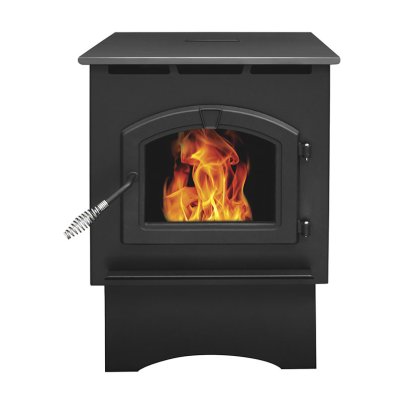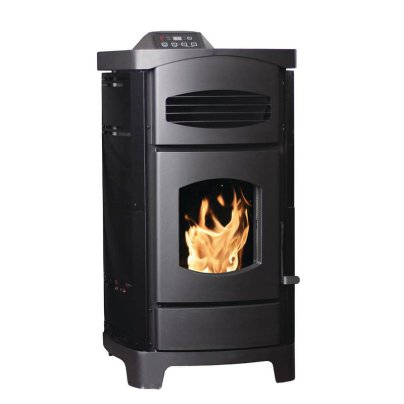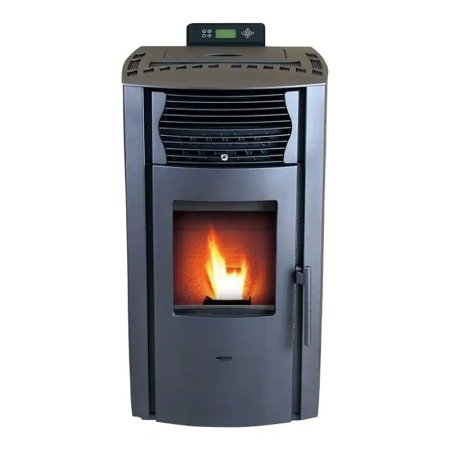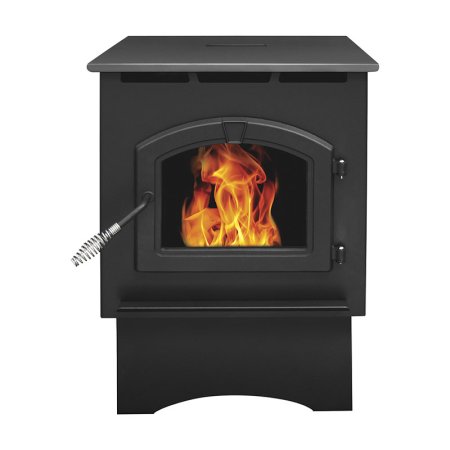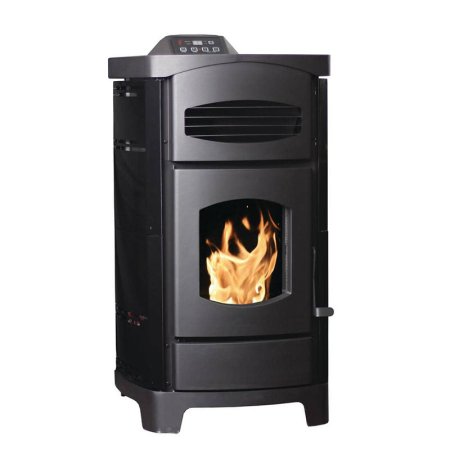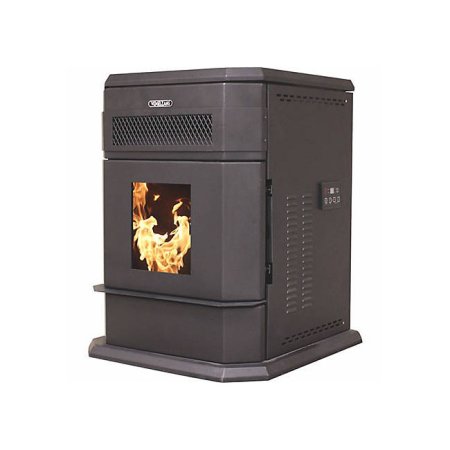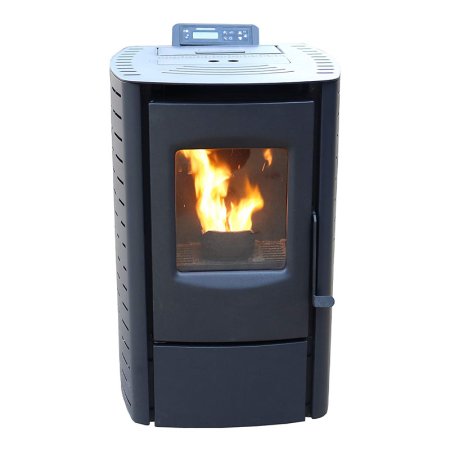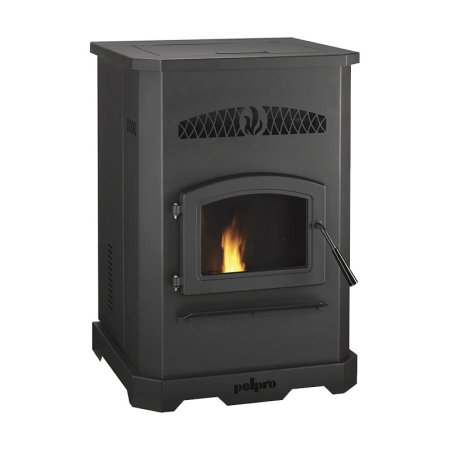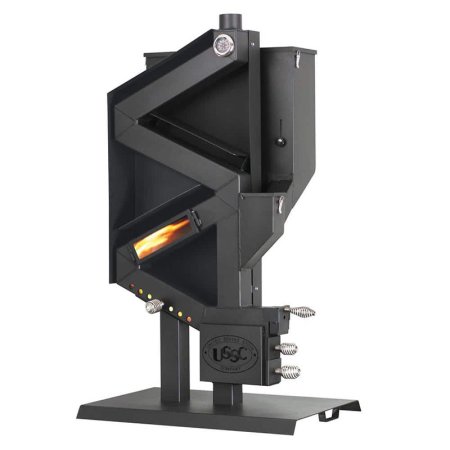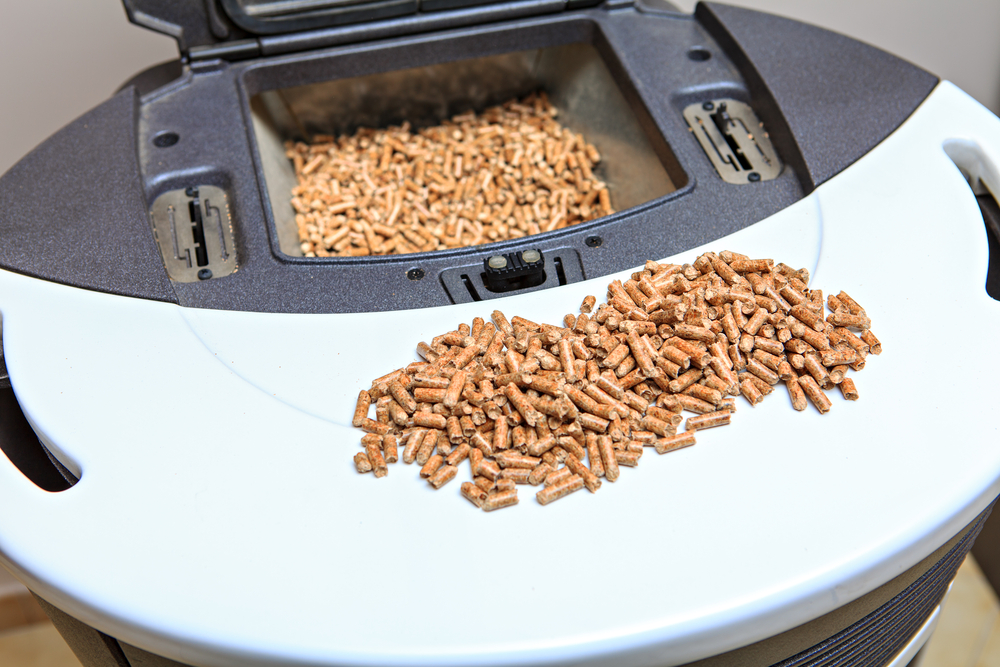
We may earn revenue from the products available on this page and participate in affiliate programs. Learn More ›
In a hard-to-heat area, such as a sunroom, a cabin with no central heating system, or any living or sleeping area of the home, a pellet stove can provide warmth during the colder months. Although a pellet stove looks similar to a wood stove, it burns hardwood pellets instead of wood. These pellets burn more efficiently and cleanly than wood.
Unlike a wood stove, which requires owners to constantly add fuel to the fire, pellet stoves contain hoppers that automatically load pellets into the firebox. These hoppers can hold enough fuel to keep the pellet stove burning for up to 3 days before running out of fuel. Pellet stoves come in various sizes and styles to meet different-size homes, so choosing the right one can get confusing.
I’ve conducted extensive research on more than 20 pellet stoves from leading brands, evaluating specifications and customer reviews to whittle down our recommendations. Keep reading to learn which factors are the most important to consider when shopping for the best pellet stove, and which models meet these requirements.
- BEST OVERALL: ComfortBilt HP50-Grey Pellet Stove
- RUNNER-UP: Pleasant Hearth Pellet Stove
- BEST BANG FOR THE BUCK: Ashley Hearth Products EPA Certified Pellet Stove
- BEST LARGE-CAPACITY: Vogelzang Pellet Stove, 120 lb. Hopper
- BEST FOR SMALL SPACES: Mr. Heater Cleveland Iron Works Mini Pellet Stove
- BEST FOR LARGE SPACES: Pelpro Pellet Stove
- BEST NONELECTRIC: US Stove Wiseway Gravity Fed Pellet Stove
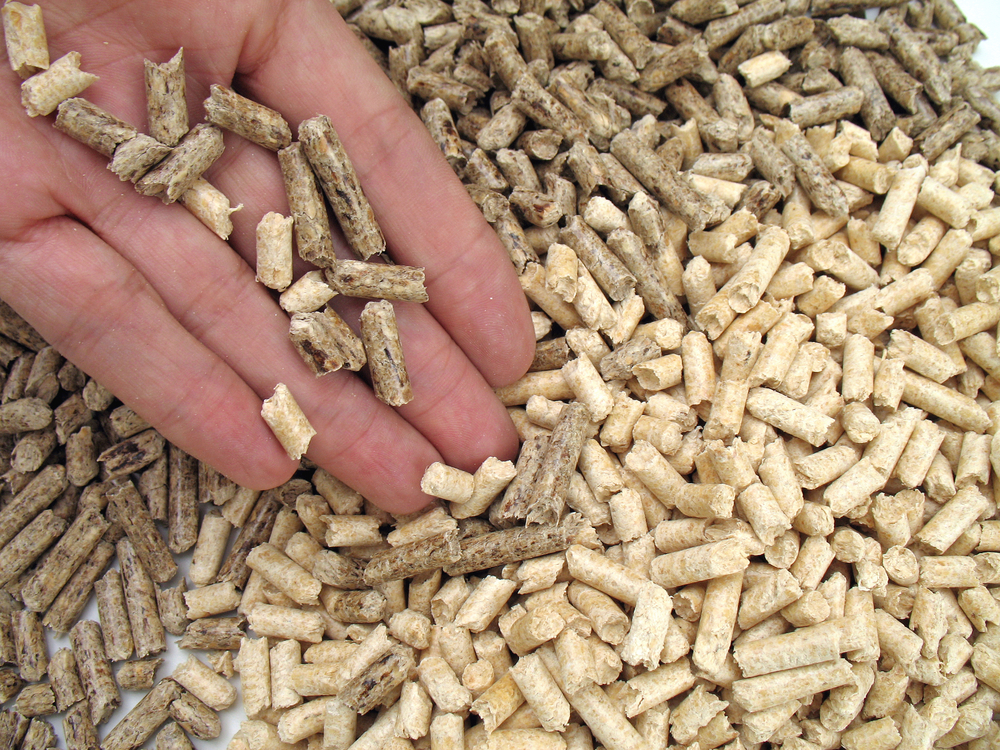
What to Consider When Choosing the Best Pellet Stove
Understanding how much heat a pellet stove produces, as well as its venting requirements, is key to purchasing the best stove for a home. Ahead, learn more about these and other important attributes of pellet stoves.
Types of Pellet Stoves
The three types of pellet stoves are freestanding, wall-mount, and insert.
- Freestanding: This is by far the most common type of pellet stove. A freestanding pellet stove consists of a solid steel and cast-iron box on a pedestal or four feet. Since it’s freestanding, this type of pellet stove can be placed anywhere in a room and requires a buffer of just a few inches from adjacent walls. In addition to providing heat, a freestanding stove adds rustic charm to a room’s decor.
- Wall-mount: Wall-mount pellet stoves, much less common than freestanding, serve as supplemental heating for homes in colder climates. Wall-mount pellet stoves attach to the wall, saving floor space. While freestanding pellet stoves have a rustic look, wall-mount models are more utilitarian, with a plain front panel and only a small window for viewing the flame.
- Insert: An insert pellet stove installs into an existing hearth, turning a wood-burning fireplace into an efficient pellet-burning unit.
BTU Rating
The heat output of a pellet stove is expressed in BTUs (British thermal units), which is a measure of the amount of heat the stove produces. Most pellet stoves produce between 20,000 and 48,000 BTUs, which is enough to heat between 1,500 and 2,400 square feet of space.
Pellet Type and Hopper Capacity
Pellet stoves burn hardwood pellets, which are fed into the stove’s firebox via a motorized hopper. The hopper’s capacity determines how long the pellet stove can burn before needing a refill. Most hoppers hold between 30 and 50 pounds of hardwood pellets, which can supply up to about 35 hours of burn time on a low setting. Stoves with large hoppers can hold 100 pounds or more and can run for days before needing more fuel.
Pellets come in two grades: premium-grade with an ash content below 1 percent; and standard-grade, with a higher ash content of between 1 and 3 percent. Premium-grade pellets burn longer and produce less ash than standard-grade varieties.
Energy Efficiency
Pellet stoves certified by the Environmental Protection Agency (EPA)—the most recommended purchase—typically have between 70 percent and 83 percent efficiency. The percentage delineates the amount of heat created by the stove that provides warmth for a room versus the amount lost through the stovepipe. For example, a pellet stove that is 75 percent efficient will lose 25 percent of its heat through the burning process, which is usually through the stove’s vent.
Temperature Control
The pellet stove’s thermostat collects air from the room, then adjusts the airflow to the stove as well as the amount of fuel the hopper delivers to the firebox.
Temperature controls on pellet stoves vary. Higher-end models have digital controls that allow the user to set a specific temperature, and some even come with remote controls. Lower-end models have analog dials with low and high settings rather than specific settings.
Electric or Nonelectric
Electric pellet stoves use a mechanical hopper powered by electricity to deliver a constant supply of fuel to the firebox, which means it must be near an electrical connection. Nonelectric pellet stoves use either a gravity feeder to deliver pellets to the firebox or require the user to load pellets into the stove’s firebox manually.
Venting Requirements
Pellet stoves produce emissions that must be vented to the outside of the home via a flue and come equipped with a 3-inch exhaust port and 2-inch air intake for proper venting. Follow these guidelines when venting a flue:
- The flue must extend from the stove to the outside of the home either through a masonry chimney or externally on an outside wall.
- The flue must maintain a distance of at least 3 inches from any combustible material as it travels through the home.
- After it exits the house, the flue must extend far enough above the roofline that the exhaust does not waft back into the house.
In addition to an exhaust vent, pellet stoves have air intake vents that supply the combustion chamber with a sufficient amount of oxygen. The air intake can take oxygen directly from the room or draw air from the outside, in which case it requires additional components to connect the vent to the outside of the home. If the intake vent takes air directly from the room around it, the room may need an external wall air vent to prevent the stove from lowering oxygen levels in the room.
Easy to Clean
Pellet stoves produce less ash and mess than wood-burning fireplaces, but they still require cleaning. Easy-to-clean pellet stoves have firepots and ash pans to remove and dump out, making them simpler to clean than models without these features. Some pellet stoves have air wash systems that constantly draw air over the window to help keep smoke and gases off the glass.
Our Top Picks
This list trims the field to some of the best-rated pellet stoves on the market. These stoves produce enough heat to warm spaces ranging from 800 square feet to 2,200 square feet, and they feature high-capacity hoppers that can burn for days without requiring a refill.
Best Overall
ComfortBilt HP50-Grey Pellet Stove
Pros
- High efficiency rating
- Large-capacity hopper keeps fire burning for 22 hours
- Remote control operation
Cons
- More expensive than other pellet stoves
Product Specs
- Heat output: 44,000 BTUs
- Efficiency: 81 percent
- Hopper capacity: 47 pounds
With a large hopper capacity coupled with high heat output and multiple heat settings, the ComfortBilt HP50 is a good option for providing supplemental heat in a home. Its 44,000-BTU maximum heat output is enough to warm up to 2,200 square feet, while its five heat settings provide adequate control for its output. This stove is also easy to clean, thanks to an 81 percent burn efficiency rating that requires emptying the stove’s ash pan only about once every 3 weeks.
A large 47-pound hopper keeps the fire burning unattended for up to 22 hours on the lowest setting, while a powerful blower (142 cubic feet per minute) circulates heat through the space. The thermostat, which ranges from 61 to 82 degrees Fahrenheit, is adjustable via an LED panel or the handy remote control.
Get the ComfortBilt HP50-Grey Pellet Stove at The Home Depot.
Runner-up
Pleasant Hearth Pellet Stove
Pros
- High efficiency rating
- Compact size
- Self-cleaning window
Cons
- Smaller coverage area than other pellet stoves
- Analog control
Product Specs
- Heat output: 35,000 BTUs
- Coverage: 1,750 square feet
- Hopper capacity: 40 pounds
Though not as large as some of the other pellet stoves on the market, this model makes up for it with its efficient design. This Pleasant Hearth model puts out 35,000 BTUs with 85 percent efficiency, ensuring users get the most out of each bag of pellets they load into its 40-pound capacity hopper.
While it’s not as large as other pellet stoves, it still produces enough heat to warm up to 1,750 square feet. Its analog control knob isn’t as precise as an LED or digital control, but it allows for temperature changes in small increments. The Pleasant Hearth pellet stove includes an air wash system that keeps its window clear for viewing flames. And, at just 21.5 inches wide and 34 inches deep, it’s more compact than other pellet stoves.
Get the Pleasant Hearth Pellet Stove at Northern Tool & Equipment, Tractor Supply Co., or Wayfair.
Best Bang For the Buck
Ashley Hearth Products EPA Certified Pellet Stove
Pros
- High heat output for the money
- Tall and slim design saves space
- Remote control included
Cons
- Taller profile may not appeal to everyone
Product Specs
- Heat output: 48,000 VTUs
- Efficiency: EPA certified
- Hopper capacity: 46 pounds
With a price tag that’s lower than most similar-size pellet stoves, Ashley Hearth Products’ EPA-certified 48,000-BTU model is one of the best pellet stoves for the money. It’s large enough to warm a space up to 2,200 square feet and contains a 46-pound hopper that can supply fuel for up to 32 hours at the lowest setting.
This pellet stove has a tall, narrow design that’s suitable for homes in which floor space is a premium. Despite its lower price, it includes add-ons usually only on higher-end stoves, including a remote control and digital display. A large window provides a view of the burning pellets while a top-mounted blower distributes heat throughout the room.
Get the Ashley Hearth Products EPA Certified Pellet Stove at The Home Depot or Ace Hardware.
Best Large-Capacity
Vogelzang Pellet Stove, 120 lb. Hopper
Pros
- Large 120-pound capacity hopper
- Can burn for up to 50 hours
- High 65,000-BTU heat output
- LED control panel
Cons
- No remote control
Product Specs
- Heat output: 65,000 BTUs
- Coverage: 2,200 square feet
- Hopper capacity: 120 pounds
Those who don’t like constantly adding fuel to their pellet stove will appreciate the massive 120-pound hopper on this pellet stove from Vogelzang. When fully loaded, the automatic hopper can keep the fire burning for up to 60 hours. It puts out 65,000 BTUs, enough to heat up to 2,200 square feet even in colder climates.
A large blower at the top of the unit is powerful enough to distribute warm air to the far reaches of larger rooms, while an LED display on the stove’s side allows the user to dial in precise temperature settings. A window on the front door provides a view of the flames.
Get the Vogelzang Pellet Stove at Tractor Supply Co.
Best For Small Spaces
Mr. Heater Cleveland Iron Works Mini Pellet Stove
Pros
- Compact size
- Wi-Fi connectivity
Cons
- Less coverage than larger stoves
Product Specs
- Heat output: N/A
- Coverage: 800 square feet
- Hopper capacity: 18 pounds
This pellet stove from Cleveland Iron Works is an ideal option for smaller spaces. It produces enough heat to warm an 800-square-foot space and features digital controls that allow the user to dial in specific temperatures. A window that takes up most of the stove’s front door makes the flames completely visible.
With its Wi-Fi connectivity, this stove can operate remotely via a user’s app or voice when combined with a virtual assistant. The stove also comes with a standard remote control. A powerful 250-cubic-feet-per minute blower distributes heat evenly throughout the home. While the stove’s 18-pound capacity hopper may be smaller than other models, it’s large enough for this mini model to keep the stove running all day.
Get the Mr. Heater Cleveland Iron Works Mini Pellet Stove on Amazon or at Appliances Connection.
Best For Large Space
Pelpro Pellet Stove
Pros
- Large heat output
- Extra-long burn time with high-capacity hopper
- High 82 percent efficiency rating
Cons
- Uses an analog temperature control
Product Specs
- Heat output: 50,000 BTUs
- Coverage: 2,200 square feet
- Hopper capacity: 130 pounds
What this Pelpro Pellet Stove lacks in flashy controls it makes up for in raw power and capacity. With its 50,000-BTU output, this large pellet stove can warm up to 2,200 square feet even in frigid temperatures. That ample heat output coupled with an 82 percent burn efficiency makes it an ideal choice for larger rooms.
This pellet stove boasts a large 130-pound hopper, allowing it to burn for a whopping 80 hours before needing a refill. Temperature adjustments are made via an analog control on the back of the unit. A large 256-cubic-feet-per-minute blower circulates warm air from the stove, while an auto igniter makes it easy to start.
Get the Pelpro Pellet Stove at Northern Tool & Equipment or Tractor Supply Co.
Best Nonelectric
US Stove Wiseway Gravity Fed Pellet Stove
Pros
- Requires no electricity
- Can operate for 36 hours before refilling
- Can heat up to 2,000 square feet
Cons
- Not as attractive as other stoves
- No electric blower to distribute heat
Product Specs
- Heat output: 40,000 BTUs
- Coverage: 2,000 square feet
- Hopper capacity: 60 pounds
This US Stove Wiseway pellet stove uses a gravity feeder that requires no electricity, so it’s a good choice for mountain cabins or homes that experience frequent wintertime power outages. The hopper can hold 60 pounds of wood pellets, which is enough to supply up to 36 hours of heat before needing a refill. Air intakes on the front of the stove allow the operator to adjust the stove’s heat, which radiates from 3½-inch tubing and steel baffles at its rear.
The stove produces 40,000 BTUs of heat, which is enough to warm up to 2,000 square feet of space. Since it has no electrical ignition, the stove requires a propane torch to light it. Though not as visually attractive as conventional pellet stoves, it features a small window for viewing flames.
Get the US Stove Wiseway Gravity Fed Pellet Stove at The Home Depot.
Our Verdict
With a large-capacity hopper that can run for up to 22 hours on a single load, an ability to warm up to 2,200 square feet, and advanced controls that include an LED display and remote control, the ComfortBilt pellet stove tops our list for the best wood pellet stove. Those looking for a more affordable model may want to consider the Ashley Hearth Products pellet stove, which offers similar performance at a lower price.
How We Chose the Best Pellet Stoves
We considered numerous criteria when analyzing the features of more than 20 pellet stoves for this guide. How well a stove can heat a space is crucial, so we selected models with ample heating power. Our selections range from a mini stove that can heat up to 800 square feet to full-size stoves that can warm up to 2,200 square feet. A pellet stove shouldn’t have to be tended constantly, so we chose models with large hoppers capable of burning for a day or more without refilling. Finally, we went with stoves that provide controls that make it easy to adjust to the desired temperature.
The Advantages of Owning a Pellet Stove
The biggest advantage of owning a pellet stove is its ability to provide supplemental heating during those cold winter months, taking pressure off a central heating system. A pellet stove can even serve as a home’s sole source of heating in the fall and spring.
Pellet stoves also are easier to use than wood-burning stoves or fireplaces since there is no need to chop and start wood. Moreover, they make less mess and burn more efficiently. Pellet fuel is easier to transport and takes up less space than firewood.
Pellet stoves use recycled materials and produce fewer emissions than other types of fuel. This versatile heat source can be placed anywhere in a home as long as the stove is properly vented, and, if necessary, near an electrical outlet. The best pellet stoves:
- Provide supplemental heating in the wintertime
- Can serve as the sole source of heat in milder weather
- Burn more efficiently and make less mess than wood
- Produce fewer emissions than other fuels
- Can be placed anywhere in a home
- Safety Tips for Using the Best Pellet Stoves
Since pellet stoves use combustion to create heat and produce emissions, it’s crucial to follow certain safety guidelines when using them. Pellet stoves get very hot, so keep young children and pets away from the stove while it’s in use. A pellet stove can potentially release carbon monoxide into the air, so make sure to install carbon monoxide detectors in the same room as the stove.
Clean the pellet stove regularly to ensure it vents and functions properly. Finally, use only those pellets recommended by the stove manufacturer.
- Keep children and pets away from the stove.
- Install a carbon monoxide detector in the room.
- Clean the pellet stove regularly.
- Use the correct type of pellets for the stove.
FAQs
If you make sure to properly vent the pellet stove and follow safety guidelines, pellet stoves are a safe way to heat your home.
Though prices can fluctuate, a ton of pellets and a cord of firewood generally cost about the same. Since a ton of pellets will burn longer and create more heat than a cord of firewood, pellets are cheaper to burn than wood.
A 20-pound bag of pellets should last about 12 hours depending on the heat setting on the stove.
Pellet stoves are between 70 percent and 83 percent efficient according to the Environmental Protection Agency. This percentage is the amount of heat produced by the stove that goes into warming the air around it.
No. Pellet stoves can burn wood only in pellet form. Attempting to use a pellet stove to burn other types of wood is dangerous.

